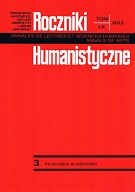Filozofowie i filozofia w Geografii Strabona z Amasei
Philosophers and Philosophy in Strabo's Geography
Author(s): Sylwia WilczewskaSubject(s): Language and Literature Studies
Published by: Towarzystwo Naukowe KUL & Katolicki Uniwersytet Lubelski Jana Pawła II
Keywords: Strabo; Eratosthenes; Homer; stoicism; skepticism; philosopher; philosophy; Strabon; Eratostenes; stoicyzm; sceptycyzm; filozof; filozofia
Summary/Abstract: Strabo of Amasia in his Geography often mentions philosophers, under whose name he includes the thinkers related to particular schools as well as Indian and Egyptian priests, Celtic druids, and Homer—the only poet referred to in the Geography as philosopher. In the narrower meaning, Strabo gives the name of philosophers only to the first group, but in the broader sense he includes all universal scholars, in accordance with the Stoic understanding of philosophy; the introduction to the Geography reflects also a general view of the Stoics that ethics stems from the natural sciences. The remarks in the introduction which concern philosophy serve also Strabo’s polemical goals in his dispute with Eratosthenes of Cyrene about the credibility of Homeric epics as a source of geographical and historical knowledge: Eratosthenes, a Platonist under the influence of Academic skepticism, claims that poetry aims at entertaining and not at educating, whilst Strabo, a convinced Stoic, takes poetry to be the first form of philosophy which allows for delivering the truth about the world to unlearned recipients. Philosophical differences of Eratosthenes and Strabo are also connected with their different perception of the role of particular disciplines—Eratosthenes separated them from each other, but Strabo, in accordance with the traditional view, united them in service of philosophy, which teaches the art of achieving happiness in one’s life and thus is the most important area of knowledge.
Journal: Roczniki Humanistyczne
- Issue Year: 60/2012
- Issue No: 03
- Page Range: 65-74
- Page Count: 10
- Language: Polish

